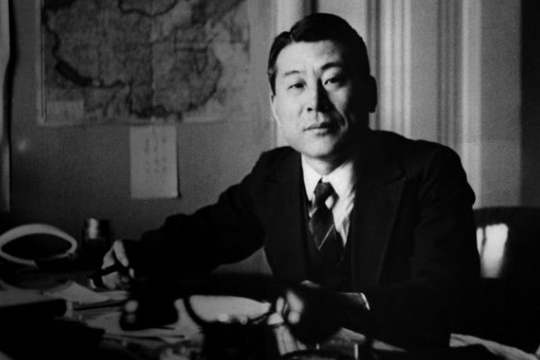

Chiune Sugihara was a Diplomat and Vice-Consul for the Empire of Japan in Lithuania who issued Japanese visas to more than 6,000 Jewish refugees saving them from the German Holocaust, extermination program led by Adolf Hitler and the Nazis during world war II(1941 -1945).
Chiune Sugihara is the best famous issuing issued Japanese visas to more than 6,000 Jewish refugees saving them from the German Holocaust, extermination program led by Adolf Hitler and the Nazis during world war II(1941 -1945) who was Diplomat and Vice-Consul for the Empire of Japan in Lithuania.
Chiune Sugihara was born on January 1, 1900, in Yaotsu, Gifu Prefecture, Japan and died on July 31, 1986, Kamakura, Kanagawa Prefecture, Japan. He is the second son of father Yoshimizu, and mother Yatsu (a family of five boys and one girl). Sugihara was raised in the strict Japanese code of ethics in a samurai family. His birth sign Capricorn. As a young man in junior high school, he was good at English and hoped to be an English teacher. His education history includes Kuwana Elementary School(1907), transferred to Nakatsu, then to Furuwatari, Schools. He graduates from Furuwatari School(1912), Nagoya Daigo Chugaku (1917), Waseda University, Majors in English Literature(1918), Harbin Gakuin (National University - 1919) and Harbin Gakuin (National University - 1923). As an adult, Sugihara was interested in foreign ideas, religion, philosophy, and language.
His career started after he got appointed as a clerk in the Harbin Japanese Embassy in 1924 where he became a professor in 1930. In 1932, he became Deputy Consul of Manchurian Government Foreign Ministry in Lithuania. The following year, he was appointed as Chief of Northern Manchurian Railroad Aquisition Office, by the Manchurian Government Foreign Ministry; as Section Chief of Russian & Planning. In 1934, he resigned in protest of the ill-treatment of the Chinese. He then returned to Japan in 1935 and worked in several top-ranking organizations and governmental bodies that includes, as a translator for the Japanese Embassy in Russia(1936) and Japanese legation, Helsinki, Finland(1937), as Japanese Consul in Lithuania(1939), as Japanese Consul to Czechoslovakia, via Berlin where he issued visas to Polish refugees(1940), as Consul General to Königsberg(1941), as Consul General to Romania(1942).
Sugihara was imprisoned in a Russian internment camp in Romania by the of World War II in 1945. In 1947 he returned to Hakata port (Japan) on the Koan – Maru (ship), Settled in Fujisawa City, Kanagawa Prefecture and he worked for World Peace Foundation. He then again worked for many companies that include, U.S. Trading Company(1946), as General Manager of U.S. Military Post Exchange(1950), as Sanki Trade Executive(1952), as a professor for Nikolai Russian Language School and translator for Japan Science & Technology Agency(1954),N.H.K. Broadcasting, International Section(1957), as Moscow Office Chief, Kawakami Trade Company and Chori Trade Company(1960) and as executive Branch Manager, Kokusai Koeki Company, Moscow(1965). In his later days, Sugihara retired from his job in 1976 and was honored with several awards and titles making him the war hero of the world war II.
1984 Tree planting in Sugihara’s honor in Israel. 1985 Receives “Righteous Among the Nations” award by Israel’s Holocaust Memorial, Yad Vashem. 1989 “Courage to Care Award” awarded by Anti-Defamation League, New York. 1990 “Raoul Wallenberg Award” awarded by Shaare Zedek Hospital of Jerusalem, New York. Yukiko Sugihara writes her autobiography. 1991 Mir Yeshiva School establishes “Sempo Sugihara Scholarship”, Brooklyn. A street in Lithuania is named after Chiune Sugihara. 1992 The Hill of Humanity monument dedicated by Yaotsu Town, Chiune’s hometown. Sugihara receives Nagasaki Peace Prize. 1993 Yukiko, Sugihara's wife visits the United States Holocaust Memorial Museum. Visits Sugihara plaque there.
Japanese high school applies Sugihara’s story in an English textbook. 1994 Bar Ilan University opens a Sugihara Center. Sugihara survivors and their families visit Japan. 1995 Receives Holocaust Oral History Project award. Yukiko Sugihara visits Mir Yeshiva, Brooklyn, N.Y. Sugihara Exhibit opened at the Simon Wiesenthal Museum of Tolerance. Honored by Steven Spielberg at Holocaust testimonial dinner, January. Yukiko Sugihara’s autobiography “Visas for Life” published in French, Portuguese, and English.
According to Wikipedia, Forbes & Various Online resources, Chiune Sugihara's estimated net worth $16 Million. His information regarding houses, lands, and cars are yet not revealed.
He married a Caucasian woman named Yukiko((m. 1936–1986)), who helped him greatly in saving the Jews. He had four sons with his wife, Hiroki Sugihara, Nobuki Sugihara, Haruki Sugihara, and Chiaki Sugihara.
Sugihara's body measurements are still not in public record. he dies at the age of 86.
He was out of this facility back then.